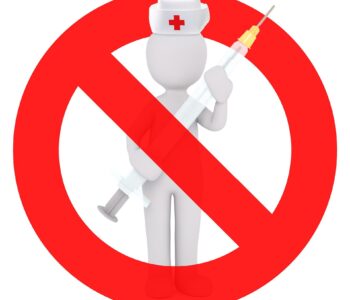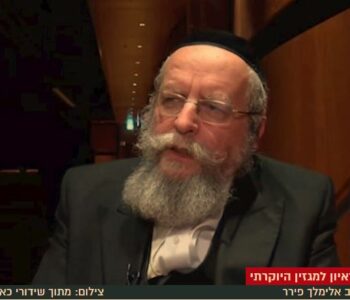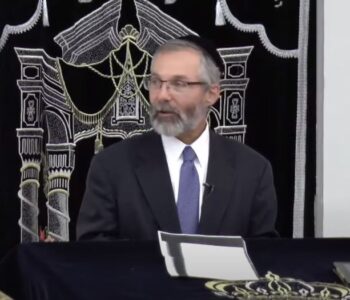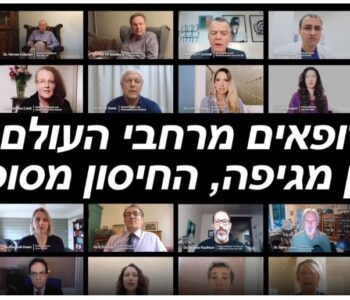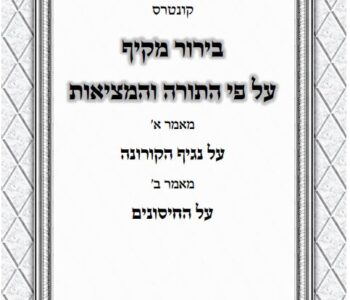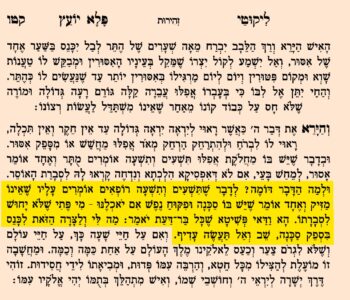
The following was written by Rabbi Raphael Szendro. We are pleased to reprint it on Rodef Shalom 613.
בס”ד
מוצש”ק פ’ שפטים ושטרים תתן לך, תשפ”א
Talmudic Law 101
Medical Ethics, Vol. 1, Part 1
By Raphael Szendro:
rszendro@gmail.com
8/15/2021
Semmelweiss 2.0*
“. . .why must we listen to the doctors? There are those who blindly follow and trust doctors, worshipping them like heathen idols, Heaven forbid.”
– Rabbi Moshe Feinstein, of blessed memory (1895-1986)1
Every thought, decision and action is governed by Halacha (Jewish law). How to get dressed in the morning, what to eat, how to eat, business ethics, marriage, divorce, childbirth, death, and everything in between, is regulated by a plethora of guidelines detailing every possible scenario we may encounter.
Over the past year, we were confronted with major challenges, both globally and individually. These life hanging decisions are no exception to the rule, and a proper response can only be ascertained by following the Divine principles and guidelines of Halacha. I would like to tackle the following topic:
From the perspective of Jewish law, what is the appropriate approach to protect oneself against Covid-19? Should everyone take the vaccine? Or is it better to rely on our innate immune system, and depending on each individual case, use supplements such as HCQ, zinc, or other prophylactics and therapies? Or is it best not to get involved with any medical intervention at all?
I would also like to discuss a few issues regarding lockdowns and masking. It would be both impractical and futile to delve into the hundreds of papers and studies written on these topics, interview dozens of experts, and attempt to determine which approach is “right” and which is “wrong”. Rather, we will simplify the question by exploring a methodology which can offer guidance in accordance with Halacha. But that doesn’t mean we’re off the hook. Individual studies and relevant facts must be analyzed to a certain degree. Jewish law, or any law for that matter, does not exist in a vacuum. Specific factual information must be understood and clarified before anyone can claim to have reached an appropriate and responsible conclusion.
I believe the underlying “simplified” question we need to ask is the following: When there is a dispute between experts, which opinion should we follow? This is not necessarily going to be an easy question to answer, but who said life is supposed to be easy? My goal is to review various sources in Halacha which can help guide us in the right direction.
But before we get into all the intricacies and sources which address this point, there is a roadblock, approximately the size of Mount Everest, which needs to be cleared out of the way before we can begin our journey. This oversized roadblock is what R’ Moshe Feinstein זצ”ל was referring to in my opening quotation. R’ Moshe noticed a problem back in the 70s, which has grown exponentially since then. I want to be perfectly clear what R’ Moshe was saying, and why I am quoting him. Please do not misquote me, or R’ Moshe, that we are advising people not to listen to doctors. On the contrary, we know that R’ Moshe consulted with medical experts and followed their advice on a regular basis. Instead, he is simply telling us not to worship them.
Check with your local rabbi, but I believe idolatry is universally frowned upon in Jewish tradition. To be fair, R’ Moshe does not seem to be literally comparing this to idol worship, just as people worshipped the sun, the moon, a cow or a sheep in ancient times. But even if he meant it in the not-so-literal sense, it is clear from his choice of words that we need to avoid doing it.
What did he mean, then, that there are those who worship doctors? First, what does it mean to worship G-d? On a basic level it means: to dedicate and subjugate one’s intellect and desires to fulfill His will. G-d said to Abraham: קח נא את בנך את יחידך אשר אהבת – please take your only son, whom you love…and bring him up as an offering. Rabbeinu Nissim2 explains that this was not a commandment which Abraham was required to obey. Rather, it was a request. This is evident from the language: קח נא – please take.3 G-d had already promised Abraham: כי ביצחק יקרא לך זרע – through Isaac will offspring be considered yours. Abraham was fully capable and entitled to make that argument, absolving him of G-d’s request. But He was requesting from Abraham that he forgive that promise and sacrifice his son. Abraham had such a tremendous desire to fulfill G-d’s will, he was able to overcome his emotional attachment to his son, as well as the intellectual argument he rightfully could have made. Normally, however, we are not given the option to dispute or disobey G-d’s orders. When the Creator of the world commands you to do something, you do it. No questions asked. But the Talmud is full of questions and debates, one might ask. That is because we first need to understand how to interpret the laws we received at Mount Sinai, and how to apply them. Ultimately, the goal of the discussions and arguments in the Talmud are to understand G-d’s true intention within the written and oral statements and laws. Once the Talmud reaches a conclusion on any given topic, that becomes the final definition of His will, and we must follow it.
Our intellect is insignificant and irrelevant compared to His divine knowledge. It is pointless to question or contest G-d’s will. If we do not understand a certain law, it is a result of our inability to fully comprehend His ultimate wisdom.
R’ Moshe זצ”ל is pointing out that unfortunately, some people treat doctors in a similar manner. The basic mentality goes as follows: When the doctors make any type of recommendation, it is critical that everyone follow exactly what they say, no questions asked. If there is something about their advice which does not seem to make sense, you are obviously mistaken, and you have no right to ask questions. Any objection or dissenting medical opinion must be silenced, censored, and punished for foolishly suggesting that the mainstream medical system might have erred. The intellect and reasoning of other doctors and experts are trivial compared to the ultimate wisdom of the medical establishment. According to this ideology, there is no such thing as dissenting opinion. It simply does not exist.
There has never been a human being on the planet, and there never will be, to whom this level of faith should be bestowed, with only one exception: a true prophet who is conveying a direct message from G-d. But besides that, any statement, claim, or argument made by any human is always up for debate. We must subjugate our intellect to no one. If common sense tells us something is wrong, we are required to speak up. We pray three times a day that G-d grant us intellect and common sense. Those of us who are fortunate enough to have been granted this valuable gift are obliged to use it. A student who is sitting in front of Bais Din observing a trial, and believes the Dayan is making an error, is required to object. If the student does not speak up, he is in direct violation of the biblical mandate מדבר שקר תרחק.4 No human being is immune to error, even doctors.
As I explained, the primary question at hand is how to deal with conflicting opinions among doctors. Understandably, that discussion never gets off the ground if you are talking to someone who has a religious belief in the medical system. If only one opinion exists, the question makes no sense.
For example, a rabbi from NJ wrote: “…as the medical experts currently maintain – that if someone around you is unmasked, they pose a danger even to those who are masked…”. The fact is, thousands of medical experts around the world disagree with that statement. They believe that not only do masks not work, they cause the disease to spread, and are harmful to those who wear them. How can he say “as the medical experts currently maintain…”? It is because in his view, the dissenting expert opinion does not exist. He even goes on to make the argument that the concept of Elu V’Elu does not apply to the mask discussion. He is literally saying there is only one opinion on the matter. Later in the article, he admits that “most medical experts warn that it is dangerous to one’s health to be near someone who is unmasked”. But he later refers to those who disagree as “anti-maskers”. He could have just referred to them as the minority opinion, which happens to consist of thousands of doctors. But by labeling them as anti-maskers, he is portraying them as irresponsible, anti-science cavemen. We will see later that if anything, Halacha supports the position of the “anti-maskers”, and the claim that “most” medical experts support masks, is misleading.
Another rabbi wrote regarding the Covid vaccine: “expert opinion is clear that the enormous benefits presented by these vaccines far outweigh their risks”. It is a curious statement to make when thousands of doctors around the world disagree, including virologists, immunologists, and world-renowned vaccine researchers and developers. How can someone make a blanket statement that expert opinion is clear when in reality, it is entirely unclear and disputable? I asked the rabbi this question, but he declined to respond. He believes the mainstream medical community is all that exists. It is irrelevant that many experts who have spent their entire careers studying and developing vaccines believe the Covid vaccine poses tremendous risk. Those experts need to be ignored. As we will see later, Halacha clearly says otherwise.
Here is another example. I have seen a number of lengthy dissertations where the author will quote numerous sources from conventional Jewish literature showing how careful we need to be in safeguarding human life, concluding definitively and authoritatively that it is critical for everyone to wear a mask and get vaccinated. As if to say, those who are not in favor of masks and/or the Covid vaccine believe human life is dispensable. It is an immature and fallacious assessment. Of course, everyone agrees human life is invaluable. The question is, which approach is most effective in keeping everyone safe and healthy? Unfortunately, many people are not willing to acknowledge the simple fact that expert opinion exists on both sides of the issue.5
Read more here
*Rabbi Szendro titled this “Semmelweiss 2.0” since he had written a previous article in which he referenced Dr. Ignatz Semmelweiss. You can read it here.
Footnotes

